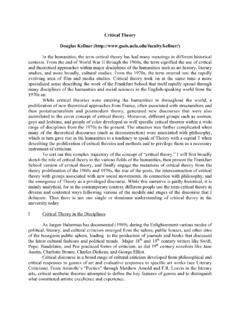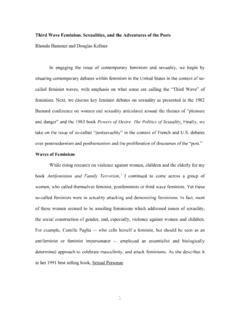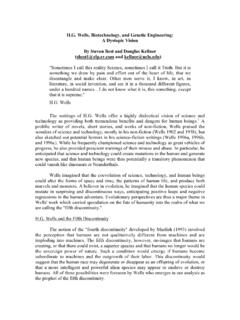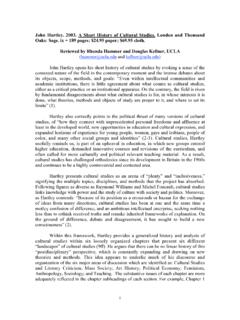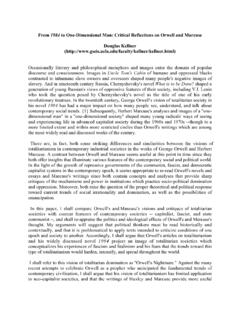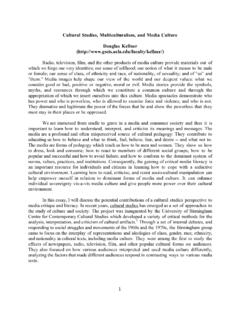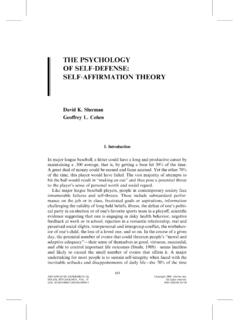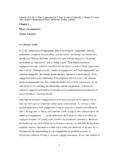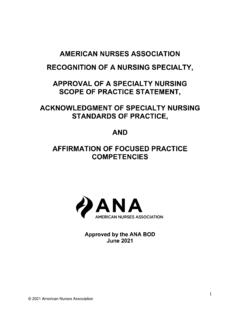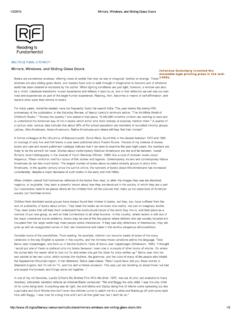Transcription of Film, Politics, and Ideology: Reflections on Hollywood Film in …
1 Film, Politics, and ideology : Reflections on Hollywood Film in the Age of Reagan*. Douglas Kellner ( ). In our book Camera Politica: Politics and ideology in Contemporary Hollywood Film (1988), M ichael Ryan and I argue that Hollywood film from the 1960s to the present was closely connected with the political movements and struggles of the epoch. Our narrative maps the rise and decline of 60s radicalism; the failure of liberalism and rise of the New Right in the 1970s; and the triumph and hegemony of the Right in the 1980s. In our interpretation, many 1960s films transcoded the discourses of the anti-war, New Left student movements, as well as the feminist, black power, sexual liberationist, and countercultural movements, producing a new type of socially critical Hollywood film.
2 Films, on this reading, transcode, that is to say, translate, representations, discourses, and myths of everyday life into specifically cinematic terms, as when Easy Rider translates and organizes the images, practices, and discourses of the 1960s counterculture into a cinematic text. Popular films intervene in the political struggles of the day, as when 1960s films advanced the agenda of the New Left and the counterculture. Films of the "New Hollywood ,". however, such as Bonnie and Clyde, M edium Cool, Easy Rider, etc., were contested by a resurgence of rightwing films during the same era ( Dirty Harry, The French Connection, and any number of John Wayne films), leading us to conclude that Hollywood film, like society, should be seen as a contested terrain and that films can be interpreted as a struggle of representation over how to construct a social world and everyday life.
3 In our readings of 1970s films, we detected intense battles between liberals and conservatives throughout the decade in mainstream Hollywood , with more radical voices -- of the sort that occasionally were heard in the late 1960s and early 1970s -- becoming increasingly marginalized. As the decade progressed, conservative films were becoming more popular ( Rocky, Star Wars, Close Encounters of the Third Kind, Superman et al) indicating that conservative sentiments were growing in the public and that Hollywood was nurturing these political currents. Indeed, we argued that even liberal films ultimately helped advance the conservative cause. A cycle of liberal political conspiracy films ( The Parallex View, All the President's M en, The Domino Principle, Winter Kills, and so on) villified the state and thus played into the conservative/Reaganite argument that government was the source of much existing evil.
4 Other films that took a perspective sympathetic to the working class and critical of business (Blue Collar, , et tutti quanti), blaming corrupt unions for the working class' problems, while liberal films dealing with race (Claudine, A Piece of the Action, and the like) attacked welfare institutions and celebrated individual initiative and self -help -- precisely the Reaganite position. And even the most socially critical films (such as the Jane Fonda films, Network and other Sidney Lumet films, and others) posited individual solutions to social problems, thus also reinforcing the conservative appeal to individualism and attack on statism. Consequently, we argued that reading Hollywood films of the decade politically allowed one to anticipate the coming of Reagan and the New Right to power by demonstrating that conservative yearnings were ever more popular within the culture and that film and popular culture were helping 1.
5 To form an ideological matrix more hospitable to Reagan and conservatives than to embattled liberals. Building on this work, I discuss in this paper some theoretical perspectives on ideology and radical cultural criticism which I'll illustrate with some examples drawn from Hollywood film in the Age of Reagan. In these remarks, I'll specify some problems with the classical M arxian conceptions of ideology and ideology critique, and will propose some perspectives that will help contemporary criticism overcome these limitations. Here, I shall draw on critical work done over the last decade and will focus my comments on the need to develop methods to read films politically. I therefore presuppose that Hollywood films are deeply political (the demonstration thereof is Camera Politica which surveys twenty years of Hollywood cinema) and that ideology critique provides a powerful perspective on Hollywood film, though, ultimately, I argue for a multiperspectival cultural theory.
6 ideology and Film: Critical M ethods Within the M arxian tradition, M arx and Engels initially characterized ideology as the ideas of the ruling class. The concept of ideology set out by in The German ideology (M arx-Engels 1975, pp. 59ff.) was primarily denunciatory, and attacked ideas that legitimated ruling class hegemony, which disguised particular interests as general ones, which mystified or covered over class rule, and which thus served the interests of class domination. In this view, ideology critique consisted of the analysis and demystification of ruling class ideas, and the critic of ideology was to ferret out and attack all those ideas which furthered class domination.@+{1} This tradition of ideology critique -- which has continued within the M arxist-Leninist tradition and other neo-M arxian circles as well -- assumes that there is a dominant ideology which is the ideology of the ruling class.
7 The problems with this concept are, to begin, that it presupposes both a monolithic concept of ideology and of the ruling class which unambiguously and without contradiction articulates its class interests in ideology . Since its class interests are predominantly economic, on this model, ideology refers primarily, and in some cases solely, to those ideas that legitimate the class rule of the capitalist ruling class, and ideology is thus those sets of ideas that promote the capitalist class's economic interests. In the last decade or so, however, this model has been contested by a variety of individuals and tendencies who have argued that such a concept of ideology is reductionist because it equates ideology merely with those ideas which serve class, or economic interests, and thus leaves out such significant phenomena as gender and race.
8 Reducing ideology to class interests makes it appear that the only significant domination going on in society is class, or economic, domination, whereas many theorists argue that gender and race oppression are also of fundamental importance and indeed, some would argue, are intertwined in fundamental ways with class and economic oppression (see also Cox 1948, Rowbotham 1972, Robinson 1978, M arable 1982, Nicholson 1985; Spivak 1988; and Fraser 1989). Thus many people have proposed that ideology be extended to cover theories, ideas, texts, and representations that legitimate domination of women and people of color, and that thus serve the interests of ruling gender and race as well as class powers. From this perspective, doing ideology critique involves criticizing sexist and racist ideology as well as bourgeois-capitalist class ideology .
9 M oreover, doing ideology critique involves analyzing images, symbols, myths, and narrative as well as propositions and systems of belief (Kellner 1978, 1979, 2. 1982). While some contemporary theories of ideology explore the complex ways that images, myths, social practices, and narratives are bound together in the production of ideology (Barthes 1956; Kellner 1980; and Jameson 1981), others restrict ideology to propositions stated discursively in texts.@+{2} Against this restrictive notion, I would argue that ideology contains discourses and figures, concepts and images, theoretical positions and myths. Such an expansion of the concept of ideology obviously opens the way to the exploration of how ideology functions within popular culture and everyday life and how images and figures constitute part of the ideological representations of sex, race, and class in film and popular culture.
10 To carry out an ideology critique of Rambo, for instance, it wouldn't be enough simply to attack its militarist or imperialist ideology , and the ways that the militarism and imperialism of the film serves capitalist interests by legitimating intervention in such places as Southeast Asia, Central America or wherever. One would also have to criticize its sexism and racism to carry out a full ideology critique, showing how representations of women, men, the Vietnamese, the Russians, and so on are a fundamental part of the ideological text of Rambo. This requires analyzing how the dimensions of class, gender, race, and imperialist ideology intersect in the film, reproducing rightist ideologies of the period. To illustrate the need and desirability of expanding the concept of ideology critique, let us now undertake a reading of Rambo which emphasizes the ways that it transcodes a certain Reaganite ideology .
